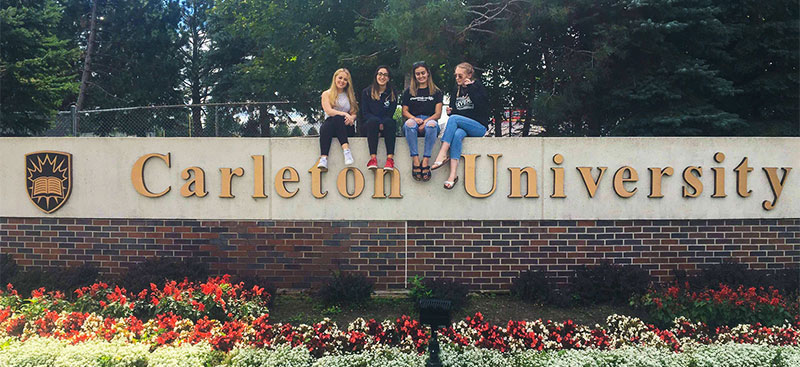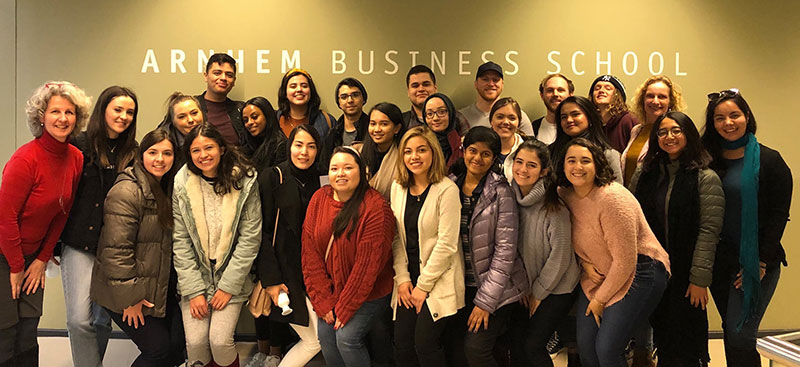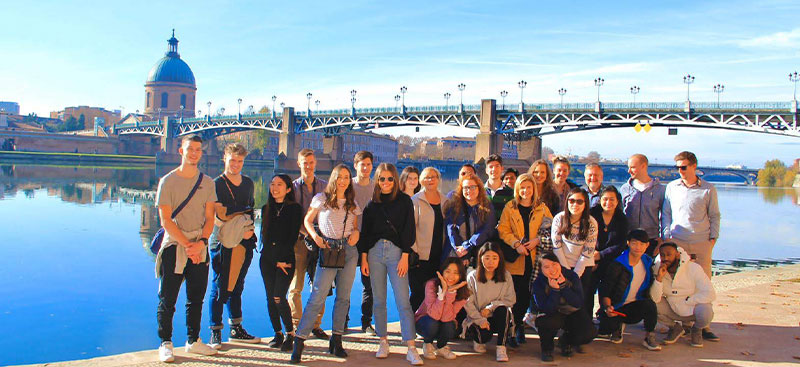Your adventure starts here!
Congratulations on making the life-changing decision to take part in an overseas study opportunity. If you’re looking at these pages, you’re about to participate in the adventure of a lifetime. These pages are full of information intended to help guide you through your overseas study experience. As with any significant travel or project, good planning and preparation are key to your success.
Every overseas study experience is unique, though there are commonalities across them all. Take a look below at the information specific to your travel type, then navigate through the other pages for further details.
Make sure to read any materials or information provided to you by the Global Opportunities team, your host institution, or the facilitator of your program. If you’re unsure about anything you’ve been asked to do, get in touch with the Global Opportunities team.
-
Semester Exchange

Carleton University, Canada - Kristen HendersonYou’ve been accepted by UniSA, now what?
Being accepted for the semester exchange program and allocated to a host university by the UniSA Global Opportunities team are just the first steps for a semester exchange. The Global Opportunities team still need to nominate you to the overseas university to make it official. Around this time, you’ll also be invited to attend a compulsory acceptance workshop so you can understand the next steps for your exchange.
Once you’ve been nominated, you’ll then need to apply to your overseas university directly. You will be provided application instructions, either from the Global Opportunities team or from your host university. The timeline for this can be anywhere from between a few days to a few months. It’s your responsibility to follow these instructions closely and be aware of any deadlines.
The host university will review your application and make a decision regarding your admission. Turnaround times differ from one university to another and notification of your acceptance can be as fast as one week or take as long as twelve weeks.
The host university will advise us once you have been accepted. In some cases, you may receive notification of your acceptance directly from the host, in this case it is important you forward this to the Global Opportunities team. The host will also send you further information regarding your exchange (important dates, visa information, health insurance requirements etc).
You can then start looking at things like accommodation, travel, and flights. Make sure you don’t book flights or accommodation until you have been accepted to your host university though as some of these costs may not be refunded if your application is not successful or postponed!
Applying & Acceptance
The application format varies significantly between universities. Some applications are completed online, others will be paper-based, and some might require input or signatures from the Global Opportunities team. The timing of the process also differs between host universities.
The Global Opportunities team will provide you with initial guidance, but it’s your responsibility to look closely at the host university website to ensure you’re completing their application correctly and before the deadline.
Make sure you attach all documentation requested. This may include any or all of the following:
- Passport copy
- ID photo
- UniSA transcript (you’ll be provided with one copy)
- Statement of purpose/motivation letter
- References and financial information
- Language certificate
- Letter of reference
- Health certificates
Courses and Credits
You must complete the equivalent of a full-time load while on semester exchange. That is, a minimum of 13.5 units and a maximum of 18 units. The measurement of courses and credit differs between universities, so you’ll need to work out the UniSA equivalent. You should refer to the host university website and the UniSA Credit Equivalencies Table to figure out which and how many courses you will need to take while overseas.
Research host university courses before your meeting and try to get course outlines or a syllabus, then discuss your course selection with your Program Director to ensure your courses are approved and that you’ll be granted credit at UniSA for those courses once completed. Finally, with your PD, complete the Student Exchange Course Approval Form.
Ultimately, it is your responsibility to ensure you’re taking the correct unit load at your host university in order to obtain the required UniSA credit. You cannot overload, and all courses taken while on exchange must be part of your UniSA program not in addition to it (i.e., must be for credit recognition).
Once all necessary pre-departure tasks are completed, you’ll be enrolled into an ‘International Exchange Program’ course in the relevant study period at UniSA. Please make sure you’re not enrolled into any other courses in the same study period as this can cause enrolment issues.
-
Short Term Opportunities

Short Term Exchange – Arnhem Business School, Netherlands - Darwishi ZahraYou’ve been accepted by UniSA, now what?
Once you’ve been accepted by UniSA to take part in your chosen short-term program, the next steps will vary depending on the program type.
Short term exchange involves students going to a UniSA exchange partner for a short course such as a summer or winter school. Each student will first need to be nominated by the Global Opportunities team to the Partner University before they can apply.
Once approved by UniSA by UniSA for Short Term Study (not exchange), students pursuing other kinds of short-term programs can apply directly to the Mobility Experience Provider or facilitator. This could be a paid summer or winter school (non-exchange), an experience with a Mobility Experience Provider, volunteering, an internship or other short program. All students seeking credit recognition need to talk to their Program Director to make sure their chosen overseas program will be recognised towards their UniSA degree. You also need to let the Global Opportunities Team know that you have applied, and which Mobility Experience Provider you have applied to.
Applying and Acceptance
Short Term Exchange - The application format varies significantly between universities. Some applications are completed online, others will be paper-based, and some might require input or signatures from the Global Opportunities team. The timing of the process also differs between host universities. The Global Opportunities team will provide you with initial guidance, but it’s your responsibility to look closely at the host university website to ensure you’re completing their application correctly and before the deadline.
The host university will review your application and make a decision regarding your admission. Turnaround times differ from one university to another and notification of your acceptance can be as fast as one week or take as long as twelve weeks.
The host university will advise us once you have been accepted. In some cases, you may receive notification of your acceptance directly from the host, in this case it is important you forward this to the Global Opportunities team. The host will also send you further information regarding your exchange (important dates, visa information, health insurance requirements etc).
Other Short Term Study – If your chosen program is delivered through a Mobility Experience Provider or a Host Institution, and you’ve been given approval from UniSA’s Global Opportunities team prior, you can complete their application and pay any fees required. The provider will notify you of acceptance into the program, which you will need to forward on to the Global Opportunities team.
Courses and Credit
Short Term Exchange - You must complete the equivalent of 4.5 units or 9 units worth of study (generally 1-2 courses worth) while on short-term exchange. Discuss your course selection with your Program Director to ensure that you’ll be granted credit for your overseas courses once completed. Ultimately, it is your responsibility to ensure you’re taking the correct unit load in order to obtain the required UniSA credit. Once all necessary pre-departure tasks are completed, you’ll be enrolled into an ‘International Exchange Program’ course in the relevant study period.
Other Short Term – Discuss your course selection with your Program Director to ensure your courses are approved and that you’ll be granted credit (or degree recognition) for those courses once completed. The Global Opportunities team may require evidence from your PD that the course credit has been approved. Ultimately, it is your responsibility to ensure you’re taking the correct unit load in order to obtain the required UniSA credit.
-
Study Tours

Study Tour – Toulouse, France - UniSA BusinessApplying and Acceptance
The process for Study Tours can vary quite a bit between programs, but advice and updates will generally be provided to you by the tour leader, or by a coordinator in your Academic Unit. You may need to apply online or in-person, or you may be interviewed by the study tour group leader.
If you are actively looking for Study Tours to take part in, you can approach your Academic Unit to see what might be available in the future. If you are unsure how to get in touch, contact the Global Opportunities team and we can point you in the right direction.
Once you have signed up for notifications or when you know that communications will be sent out by your Academic Unit, make sure you keep an eye on your email for updates and follow all instructions within requested application deadlines.
Travel is generally booked by the group leader for all participants, so make sure to keep in touch with them so you’re across the details. There will also be a pre-departure briefing of some kind run by the group leader, where you’ll receive a lot of information specific to your study tour and host destination(s).
Courses and Credit
Your study tour group leader will usually ask you to enrol you in a specific subject for the Study Tour. You will be required to complete certain assessments as part of the Study Tour, which may include participation marks for Study Tour activities, and assignments during and after the tour itself. Study Tours are different to other Global Opportunities opportunities as you generally do not get credit to your degree, and instead will have a specific grade applied just like a normal UniSA subject (e.g. HD, D, Credit etc).



